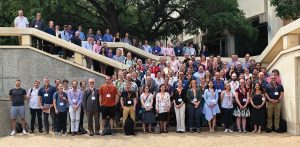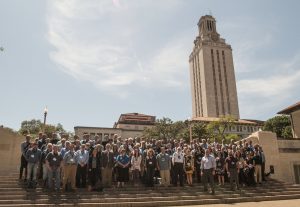New Lab, New Location
Close-in and far-out
A decade in the making, the Quadrupole ICP-MS Lab moved in Fall 2025 to larger renovated space in the Molecular Biology Building (MBB 1.318), a 580-step walk from JGB. The newly named Texas PEACE Core or PEACE Lab (Plasma Elemental Analysis CorE) features new state-of-the-art ICP-QQQ instrumentation and teaching space.
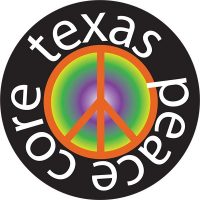
Lab Supported Research Presented at Recent National Meetings
GSA San Antonio (October 19-22, 2025)
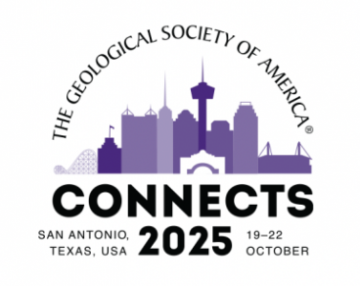
1. Libbing, SQ., Banner, JL., Porras, A, Clamann, A, Trace Metals in Austin-area Streams: Baselines for Urbanization Impacts and Climate Resilience Planning (Talk)
2. Pagán, FJ., Bahamón-Pinzón, D, Siegel, HG, Banner, JL, Impacts of Degrading Municipal Water Infrastructure on Resilience in a Water Stressed Region (Talk)
3. Bahamón-Pinzón, D, Siegel, H, Leclercq, A, Banner, JL., Pinon, C, Almanza, S, Haragan, K, Mullins, L, Pagán, F, Cardenas, BR, Siddiqui, N, Montoya, D, Drinking water quality assessment through community-based participatory research in a suburban neighborhood in Texas: The case of Austin’s Colony (Talk)
4. Locmelis, M, Clark, SL, The Complex Critical Mineral Assemblage of Lower Crustal
Sulfide Deposits – A case study from the Ivrea-Verbano Zone in Italy (Talk)
5. Bahamón-Pinzón, D, Siegel, H., Banner, JL, Community Engaged Research for Environmental Sustainability and Community Resilience (Poster)
6. Loewy, SL, Dalziel, IWD, Coats Land, a Piece of West Texas in Antarctica
7. Yale, VE., Bahamón-Pinzón, D, Banner, JL, Hunt, B, Rempe, DM, Spatial Geochemical Variability in the Middle Trinity Aquifer in a Water Scarce Region of Central Texas (Poster)
8. Banner, JL, Janelle, A, Cave monitoring in central Texas: Insights into paleoclimatology, karst vadose zone hydrogeology, and cave geomorphology (Field Course)
2D chemical mapping by LA-ICP-MS is hot! (April 29th, 2022)
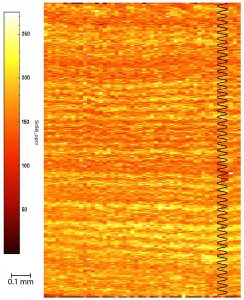
There is ever-growing interest among users for 2D chemical mapping to show spatial chemical variations. This has been applied to several diverse sample types, such are fish ear stones (otoliths) and fin spines (illicea), zircons, garnets, stalagmites, experimental glass, shark vertebrae, and carbonate cements, using spot sizes as small as 5µm. Examples here: 1, 2
Trace Element/Ca in small samples (November 2021)
We have developed a matrix-matched approach for determining M/Ca ratios in carbonate biominerals in a single dilution. The method has been tested on samples less than 0.1 mg.
LA-ICP-MS Undergrad Honors Project (Spring 2021)
Heather Gunn – Advancing the moisture amount paleoclimate proxy in central Texas stalagmite records through application of novel imaging techniques and
geochemical mapping.

North American Workshop on Laser Ablation (May 28-31, 2019)
The 3rd North American Workshop on Laser Ablation (NAWLA) was hosted by the Jackson School of Geosciences. NAWLA covers the latest progress in laser-based microanalytical instrumentation, methods and applications, and provides opportunities for informal interaction among attendees. NAWLA is run by and for the user community with the mission to facilitate laser ablation knowledge transfer and promote community among laser ablation users. NAWLA 2019 had 145 attendees from 12 countries. A brief recap of the meeting can be found here. The scientific program is available here.
North American Workshop on Laser Ablation (May 25-27, 2017)
NAWLA’17 had 130 attendees from 12 countries. A brief recap of the meeting can be found here. The scientific program is available here.
Temporary Lab Move (May 2016)
The lab moved in May 2016 to JGB 1.132 in preparation for construction of a much needed larger ICP-MS complex. The new complex should ensure that JSG researchers have access to latest equipment and best facilities for conducting cutting edge research, and improve opportunities for analytical education (hands-on learning in the lab). Construction will begin sometime after completion of the initial MC-ICP-MS lab phase.
North American Workshop on Laser Ablation (May 27-28, 2015)
The inaugural meeting of the North American Workshop on Laser Ablation (NAWLA) was hosted in the Jackson School of Geosciences. NAWLA is a new biennial meeting with the mission to transfer laser ablation knowledge between specialists and promote a sense of community among laser ablation users. The 2015 workshop lasted two days and had 110 participants. A brief recap of the meeting can be found here. The scientific program is available here.
